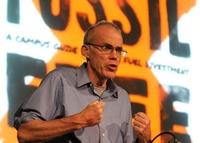The world as we know it has ended forever: that's the melancholy message of this nonetheless cautiously optimistic assessment of the planet's future by McKibben, whose The End of Nature
first warned of global warming's inevitable impact 20 years ago. Twelve books later, the committed environmentalist concedes that the earth has lost “the climatic stability that marked all of human civilization.” His litany of damage done by a carbon-fueled world economy is by now familiar: in some places rainfall is dramatically heavier, while Australia and the American Southwest face a permanent drought; polar ice is vanishing, glaciers everywhere are melting, typhoons and hurricanes are fiercer, and the oceans are more acidic; food yields are dropping as temperatures rise and mosquitoes in expanding tropical zones are delivering deadly disease to millions. McKibben's prescription for coping on our new earth is to adopt “maintenance as our mantra,” to think locally not globally, and to learn to live “lightly, carefully, gracefully”—a glass-half-full attitude that might strike some as Pollyannaish or merely insufficient. But for others McKibben's refusal to abandon hope may restore faith in the future. (Apr.)


